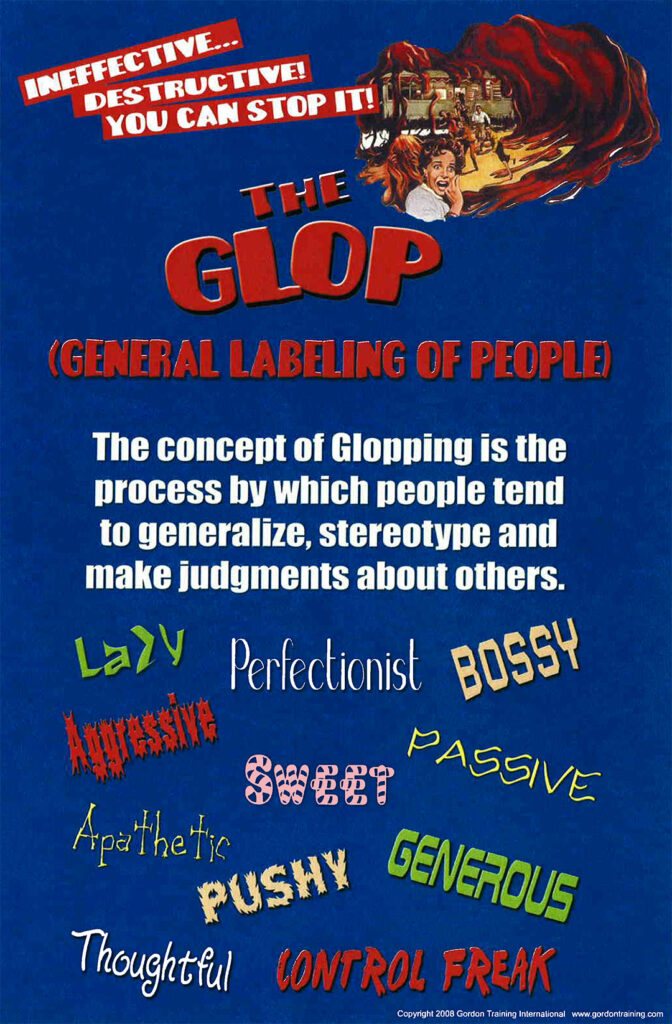By Linda Adams, President of GTI
“She’s unfriendly.”
“He’s a skeptic.”
“My child misbehaved.”
While these may seem like simple, harmless descriptions of people, in fact, they are laden with judgment.
What did that person do or say for me to jump from focusing on their specific behavior to the conclusion that they’re “unfriendly” or “skeptical” or “misbehaving”? Why is it that we automatically put labels on people and then start acting in accordance with those labels? Once we have made such a judgment about someone else whether it is positive or negative, we tend to categorize or type them based on that judgment, and then act as if it’s a fact which in turn, determines how we treat them.
For this reason I have an issue with personality instruments which are very widely utilized in companies to classify employees and their co-workers into categories. I’ve heard people describe themselves or someone at work as an “INTJ” and the like. A colleague once said to me “You’re a high ‘D’, right?” Granted, many of these tools help people gain a better understanding of themselves and a tolerance for differences among people. A problem is that some employers rely on these instruments as a basis for hiring, firing, promoting and assigning jobs. “Maybe we shouldn’t promote her to that position–she might not do well as a manager.” “I don’t think he should be assigned to that project–his head is in the clouds.”
The “blue states” vs. the “red states” is another example of this kind of labeling. In this case, red and blue aren’t merely descriptive colors, they’re judgmental statements. Even though it’s a current, quick, easy way to make a point, I think the use of these labels is divisive and tends to separate us even more and in ways that aren’t real. Just like any other judgment-laden label that categorizes people, this one is narrow and limiting and doesn’t fully or accurately describe a state or group of people.
GLOP
Labels such as these make it easier to forget our common interests and concerns. Instead we focus on the differences between us and emphasize them which creates distance, tension and friction in our relationships. In our L.E.T. and P.E.T. courses, we refer to such labels as GLOP or General Labeling Of People.
GLOP can cause us to see ourselves and each other not as unique individuals but as a certain type of person. Think back to when you were a child and remember some of the things your parents said to you. Mine include: “You’re being selfish,” “You’re so responsible,” “You’re stubborn,” “You’re as independent as a hog on ice.” Isn’t it amazing how these labels stick with us and if we allow them to, they continue to define us?
Another problem associated with GLOP is that we look for information, for behavior that confirms our original judgment and often discount evidence to the contrary.
Another Way of Looking at Behavior
Behavior is only what you can directly observe by seeing or hearing. What did that person say or do? Their attitudes, feelings, moods and thoughts are their own inner reality and are not behaviors because you can’t directly observe them. You can only guess what they might be.
Here is the difference between GLOP and descriptions of behavior using the examples I gave above:
GLOP Description of Behavior
“She’s unfriendly.” “She didn’t smile at me or say ‘Hi’.”
“He’s a skeptic.” “He asked lots of questions in the meeting.”
“My child misbehaved.” “She took stuff off the shelves in the grocery store.”
Notice that in each case, there’s a behavior that can be described–with no judgment or blame attached to it. It’s easy to see that the problem lies in our tendency to leap to an assumption about someone’s attitude or feeling underlying that behavior.
Here’s a quick assignment for you: try changing these judgmental labels into descriptions of the other person’s specific behavior (it’s harder than it seems).
“You’re too picky.”
“She’s irresponsible.”
“You’re just jealous.”
“You’re being a brat.”
What You Can Do
Become aware of any tendency you have to judge and label both yours and others’ behavior. Each time you catch yourself interpreting or evaluating or judging, make a conscious effort to go back and focus on and describe the specific behavior.
There is a major benefit of describing behavior instead of leaping ahead to label it. It is that you will maintain and improve and strengthen your relationships causing them to spiral upward.

